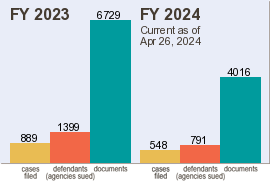About Agency Decisions on FOIA Requests
To add to our current comprehensive coverage on FOIA lawsuits, FOIAproject.org has begun tracking the handling of FOIA administrative requests. This expansion to include FOIA request data will take place on an agency-by-agency basis.
Information on FOIA requests is now available for the Immigration and Customs Enforcement (ICE). The period of coverage for this ICE data begins on October 1, 2010. Data are updated on an ongoing basis as additional records arrive.
How Information Is Obtained
Each month, we submit FOIA requests to agencies for their “augmented FOIA logs” — information is requested about each FOIA request the agency processed that month including all request-specific data the agency will rely upon at the end of the year in compiling its annual FOIA report (see sample letter). Once the information is received, we process the files, compile the information into searchable databases, and add various tags to make it easier to analyze the data. We then summarize the data and develop a variety of statistics developed to measure agency performance.
How to Access FOIA Request Data
Several tools are available to help you find, list, analyze and expand on the FOIA request data we’ve compiled. Here’s what we’ve got:
- Search requests. Case search tools let you search our data archives by the name and organization of the requestor, by the nature of the records requested, by the FOIA case tracking number, as well as various processing categories (fiscal year, requestor type, processing track, fee waiver, expedited, and subject type).
- Detail listing. From the results of your search, you can drill down to a detailed listing of the information we have for that request.
- Decisions by the numbers. Use this unique application to examine statistics on agency decisions and performance.
- Add documents. You are encouraged to upload correspondence concerning any FOIA request, such as the original request submission, the agency response(s), and administrative appeals. It is not necessary that the request be part of our existing inventory; we encourage interested users to extend coverage by sharing how any agency handled their request.
What Types of Information Are Included?
Our information on FOIA requests can be divided into three classes: information about the request (and requestor), information about the agency’s procedural decisions, and information about the agency’s substantive decision. Here’s a detailed breakdown on what might be included in each class:
- Information about the requestor and the request:
- Name of requestor. The requestor’s name.
- Company. Name of the company or organization of the requestor (where applicable).
- Document description. Description of the records requested.
- Date request received. Date the agency recorded request received.
- Agency. Agency to which the request was submitted.
- FOIA case number. Consists of the fiscal year of receipt and a sequence number assigned by the agency.
- Requestor type. Follows definitions in FOIA for charging requestors fees. Media/press and academic requestors are exempt from search fees. Commercial requestors are charged fees for search, review, and copying. Remaining requestors are charged for search and copying. ICE categorizes remaining requestors into “individuals” or “other” requestors.
- Subject. Identifies whether the request was for records about an individual (“personal”) or not (“nonpersonal”). We create this classification based on whether the agency invoked a privacy exemption in redacting the name of the requestor and/or a name which was included in the description of the records sought.
- Information on agency procedural decisions:
- Processing track. Whether request is considered by the agency as a “simple” or “complex” request based on the volume or complexity of the records requested, or is “expedited.” This later classification indicates the agency has agreed a request meets the standards for expedited processing.
- Expedited. Agency decisions on requests for expedited processing.
- Fee Waiver. Agency decisions on fee waiver requests.
- Fees paid. Amount of any fees paid.
- Information on substantive decision:
- Date closed. Actual data of the agency decision. Statistical tools summary decisions by quarter and fiscal year. The fiscal year extends from October 1 to September 30. The first quarter of a fiscal year is from October 1 to December 30, the second quarter from January 1 to March 31, and so forth.
- Decision by outcome type. Whether requested records were provided in full (“full grant”), provided in part (“partial grant”), or none were provided. There are many reasons an agency may give for not providing any records. The agency may claim that the records were exempt from disclosure in their entirety (“full denial”) or that “no records” could be located. Other closure reasons include: “referred” to another agency for response, “fee-related” because the requestor did not agree to pay required fees, “no perjury statement” submitted as to the identity of the requestor when personal records sought, the requestor “withdraws” the request, the agency closes the request without processing because it deems the request a “duplicate” of another request, not a “perfected request,” “not a proper request,” does “not reasonably describe” the records sought, records weren’t “agency records” within the meaning of the law, or some other reason.
- Exemption claim. Where the closure reason was either a “partial grant” or a “full denial,” the exemption(s) claimed under the FOIA statute to justify the withholding:
Exemption Description 1 classified national defense and foreign relations information. 2 internal personnel agency rules and practices. 3 information that is prohibited from disclosure by another federal law. In this case, the specific statute relied on should also be listed. 4 trade secrets and other confidential business information. 5 inter-agency or intra-agency communications that are protected by legal privileges. 6 information involving matters of personal privacy. 7 records or information compiled for law enforcement purposes, to the extent that the production of those records: 7a could reasonably be expected to interfere with enforcement proceedings, 7b would deprive a person of a right to a fair trial or an impartial adjudication, 7c could reasonably be expected to constitute an unwarranted invasion of personal privacy, 7d could reasonably be expected to disclose the identity of a confidential source, 7e would disclose techniques and procedures for law enforcement investigations or prosecutions, or would disclose guidelines for law enforcement investigations or procedures, or 7f could reasonably be expected to endanger the life or physical safety of any individual. 8 information relating to the supervision of financial institutions. 9 geological information on wells. - Processing time. The number of months between when the agency recorded the request was received and when it was closed. If a request is not initially considered “perfected,” the time period starts from the date the request is deemed to be perfected.
When Information Is Missing
There are a number of reasons why information about FOIA decisions might be missing from the records we received from an agency. These include:
- Not recorded. The agency may track this information in its internal database system; however, on a specific request this item of information wasn’t recorded. When this occurred the label “not recorded” is shown.
- Not tracked. The agency does not track this information in its internal database system.
- Not released (deficient agency search). The agency provided information about this request, but neglected to include this item of information even though it was requested and is tracked in its internal database system.
- Withheld. The agency redacted this information before releasing the records on this case. When practical, the particular exemption used will be shown.
- All information missing. The agency failed to provide any information about this request. Despite the legal requirements for conducting appropriate searches in processing FOIA requests, some agencies fail to meet minimum standards even when searching their own records for FOIA decisions they have made.
 Recent Tweets
Recent Tweets


